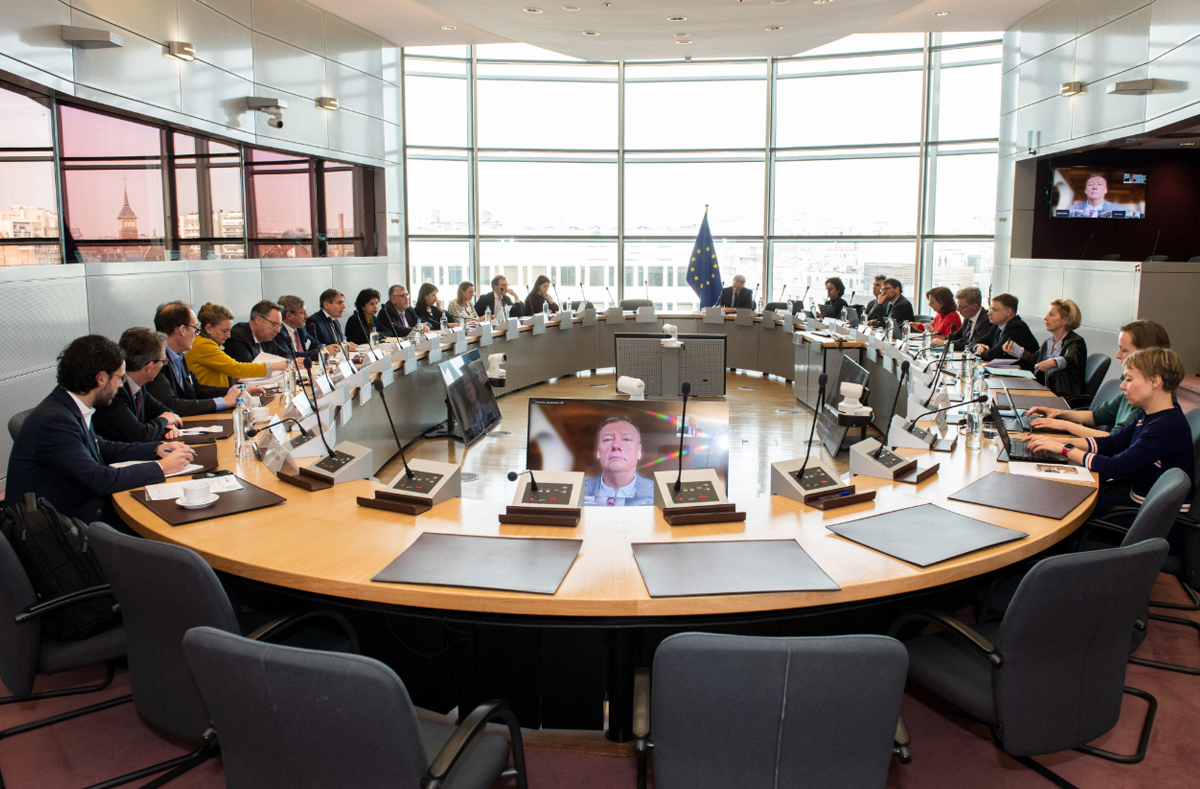BusinessEurope Headlines No. 2023-05
Critical Raw Materials Act: what is essential to support competitiveness

Ahead of the publication of the Critical Raw Materials (CRMs) Act in March, European Commission Executive Vice-President Valdis Dombrovskis organised a high-level roundtable on 16 February to exchange views on this with business. Markus J. Beyrer, BusinessEurope Director General, highlighted that to support Europe’s competitiveness at this crucial time, the upcoming Critical Raw Materials Act should focus on three pillars: first, to enable companies to diversify their supply of CRMs. For this, trade agreements, robust market access and strategic raw materials partnerships with resource-rich third countries are essential. Second, to strengthen sustainable extraction and processing of raw materials in Europe, and streamline permits procedures. Third, the right governance. Governments and companies should together identify challenges and solutions. “A top-down governance model that picks winners, puts unnecessary obligations on economic operators and impedes the level playing field should be avoided”, he said. Representatives of BusinessEurope member federations and partner companies also participated in the event.
Contact: Daniele Olivieri
Photo copyright: European Commission 2023.
Curriculum updating and reform: key to reduce labour and skills shortages
 Labour and skills shortages are prominent across a wide range of sectors and pose a real challenge to companies as they try to remain competitive and productive. To help address some of the structural aspects around these shortages, it is important that education and training curriculums are updated in a timely and effective way to reflect new labour market realities. A specific priority for BusinessEurope is to have a more coordinated reform approach for Member States to the updating of curriculums and qualifications in view of new and emerging skills needs, most notably in the context of the digital and green transitions. These were among the key messages conveyed by Markus J. Beyrer, BusinessEurope Director General, during a high-level skills seminar organised by the Swedish Presidency of the Council of the EU and Swedish social partners on 16 February. In addition to better curriculum alignment and reform, it is necessary to activate the in-active and unemployed in our societies and to continue the work to facilitate a better matching between skilled third-country nationals and job vacancies in the EU, including through setting up an EU talent pool.
Labour and skills shortages are prominent across a wide range of sectors and pose a real challenge to companies as they try to remain competitive and productive. To help address some of the structural aspects around these shortages, it is important that education and training curriculums are updated in a timely and effective way to reflect new labour market realities. A specific priority for BusinessEurope is to have a more coordinated reform approach for Member States to the updating of curriculums and qualifications in view of new and emerging skills needs, most notably in the context of the digital and green transitions. These were among the key messages conveyed by Markus J. Beyrer, BusinessEurope Director General, during a high-level skills seminar organised by the Swedish Presidency of the Council of the EU and Swedish social partners on 16 February. In addition to better curriculum alignment and reform, it is necessary to activate the in-active and unemployed in our societies and to continue the work to facilitate a better matching between skilled third-country nationals and job vacancies in the EU, including through setting up an EU talent pool.
Contact: Robert Plummer
How better regulation can improve competitiveness of European companies
 “It is positive that the European Council of 9 February in its conclusions acknowledged that we have a problem in safeguarding the long-term industry competitiveness. However, it did not address regulatory burdens and regulatory barriers for cross-border business operations,” said Martynas Barysas, BusinessEurope Director for Internal Market, at the EU Council working party on competitiveness and growth on 15 February. He was invited by the Swedish Presidency of the Council of the EU to share business views on how better regulation could contribute to the competitiveness of European companies.
“It is positive that the European Council of 9 February in its conclusions acknowledged that we have a problem in safeguarding the long-term industry competitiveness. However, it did not address regulatory burdens and regulatory barriers for cross-border business operations,” said Martynas Barysas, BusinessEurope Director for Internal Market, at the EU Council working party on competitiveness and growth on 15 February. He was invited by the Swedish Presidency of the Council of the EU to share business views on how better regulation could contribute to the competitiveness of European companies.
Barysas highlighted that the EU should urgently address the regulatory burdens, and that there are two main ways for better regulation policy to help to do so: first, we need full implementation of the Inter-Institutional Agreement on Better Law-Making by all EU institutions and systemically ensured application of the existing better regulation tools, such as impact assessments. Second, we need a strong control over and reduction of regulatory burdens. “No due consideration is given to how much investment potential is taken away in Europe by over-regulating. For example in the case of the Artificial Intelligence Act, up to 30% of the total AI investment will have to be used to cover compliance and conformity assessment costs stemming from the Act. The question is whether that is a thoroughly weighed decision”, he said.
In addition, the competitiveness check is necessary to assess how any legislative, policy initiatives or strategies and programmes, including the Commission’s annual work programmes in their entirety, impact our long-term competitiveness. Barysas underlined that such a check could be performed within the existing institutional set-up in the EU, where the EU Council should also have a strong say.
Contact: Martynas Barysas
Trade agreements support EU competitiveness: the EU-Canada example
 “Canada has resources that are critical for the EU to achieve the green transition. The EU-Canada Comprehensive Economic and Trade Agreement (CETA) has created a framework for trade in energy and for a strategic partnership on raw materials with a reliable and like-minded partner”, said Eleonora Catella, Deputy Director at the International Relations Department of BusinessEurope, at the event “CETA – creating business opportunities”, organised by the European Parliament Delegation for Relations with Canada on 14 February. In the five years of its provisional application, she added, CETA has not only had a positive economic impact but has also served as a platform for deeper cooperation between the two sides, supporting the EU’s competitiveness and resilience during times of crisis. “It is important that the ratification process is completed as soon as possible to bring legal certainty”, Catella concluded.
“Canada has resources that are critical for the EU to achieve the green transition. The EU-Canada Comprehensive Economic and Trade Agreement (CETA) has created a framework for trade in energy and for a strategic partnership on raw materials with a reliable and like-minded partner”, said Eleonora Catella, Deputy Director at the International Relations Department of BusinessEurope, at the event “CETA – creating business opportunities”, organised by the European Parliament Delegation for Relations with Canada on 14 February. In the five years of its provisional application, she added, CETA has not only had a positive economic impact but has also served as a platform for deeper cooperation between the two sides, supporting the EU’s competitiveness and resilience during times of crisis. “It is important that the ratification process is completed as soon as possible to bring legal certainty”, Catella concluded.
Contact: Eleonora Catella
A new agenda for EU relations with Latin America and the Caribbean
 BusinessEurope took part in the call for evidence published by the European Commission asking stakeholders to provide input to the joint communication on a new agenda for relations between the EU and Latin America and the Caribbean (EU-LAC). The summit between the EU and the Community of Latin American and Caribbean States (EU-CELAC), scheduled for July next, will also present an important opportunity to strengthen bi-regional relationships, promote joint interest and values, and reinvigorate our partnership. Businesses expect that the EU-CELAC Summit will give new impetus to the ratification of the trade agreements with Chile, Mercosur, and Mexico, which are key to intensify bi-regional economic and trade relations, promote standards for a sustainable economy and a level playing field, as well as to help diversify our supply chains in a context of geopolitical uncertainty. The ratification of these trade agreements is vital if we want to keep pace with our main competitors in the region and ensure a dialogue that promotes the support of multilateralism, respect of the rule of law, human rights, and democracy.
BusinessEurope took part in the call for evidence published by the European Commission asking stakeholders to provide input to the joint communication on a new agenda for relations between the EU and Latin America and the Caribbean (EU-LAC). The summit between the EU and the Community of Latin American and Caribbean States (EU-CELAC), scheduled for July next, will also present an important opportunity to strengthen bi-regional relationships, promote joint interest and values, and reinvigorate our partnership. Businesses expect that the EU-CELAC Summit will give new impetus to the ratification of the trade agreements with Chile, Mercosur, and Mexico, which are key to intensify bi-regional economic and trade relations, promote standards for a sustainable economy and a level playing field, as well as to help diversify our supply chains in a context of geopolitical uncertainty. The ratification of these trade agreements is vital if we want to keep pace with our main competitors in the region and ensure a dialogue that promotes the support of multilateralism, respect of the rule of law, human rights, and democracy.
Contact: Eleonora Catella
Life-course approach crucial for active and autonomous ageing
 Active ageing has long been one of the priority topics for the EU cross-industry social partners in the context of their Autonomous Framework Agreement on Active Ageing and an Inter-generational Approach (AFA-AAIA) of 2017. Positively, the employment rate of older workers (55-64 age cohort) has increased in the last decade from 45.9% in 2011 to 59.1% in 2019 for the EU27. Making further progress towards active ageing is a key priority in the current context of labour market shortages and shrinking working age population. From the employers’ perspective, older workers are needed more than ever on the labour market. They often have unique competences and valuable experience. Longer working lives also contribute to sustainability and adequacy of the pension systems. Active ageing starts at a young age with good lifestyle habits, willingness to learn and regular up- and re-skilling. Regularly updated competences are key to maintaining employability and a condition for longer working lives. Active ageing has different faces: older people who are professionally active need to be supported in a different way than those already retired and/or with specific care needs. These were main messages expressed by Gabriella Sebardt, Vice-Chair of BusinessEurope’s Social Affairs Committee, who represented BusinessEurope in the discussion on effective approaches to active and autonomous ageing during a high-level event organised by the Swedish Presidency of the Council of the EU on 13 February in Stockholm.
Active ageing has long been one of the priority topics for the EU cross-industry social partners in the context of their Autonomous Framework Agreement on Active Ageing and an Inter-generational Approach (AFA-AAIA) of 2017. Positively, the employment rate of older workers (55-64 age cohort) has increased in the last decade from 45.9% in 2011 to 59.1% in 2019 for the EU27. Making further progress towards active ageing is a key priority in the current context of labour market shortages and shrinking working age population. From the employers’ perspective, older workers are needed more than ever on the labour market. They often have unique competences and valuable experience. Longer working lives also contribute to sustainability and adequacy of the pension systems. Active ageing starts at a young age with good lifestyle habits, willingness to learn and regular up- and re-skilling. Regularly updated competences are key to maintaining employability and a condition for longer working lives. Active ageing has different faces: older people who are professionally active need to be supported in a different way than those already retired and/or with specific care needs. These were main messages expressed by Gabriella Sebardt, Vice-Chair of BusinessEurope’s Social Affairs Committee, who represented BusinessEurope in the discussion on effective approaches to active and autonomous ageing during a high-level event organised by the Swedish Presidency of the Council of the EU on 13 February in Stockholm.
![]() Contact: Anna Kwiatkiewicz
Contact: Anna Kwiatkiewicz
Mental health in the workplace should be addressed through social dialogue
 Adequate working conditions play a fundamental role in safeguarding mental health in the workplace. The best way to effectively address mental health at work and its underlying working conditions is through social dialogue at the appropriate level, including at sectoral and company level. Both the European Commission and the European Economic and Social Committee have previously recognised that social partners are particularly well placed to find solutions related to occupational safety and health, which is adapted to the circumstances of a specific activity or sector. There is no need for further EU legislation on mental health in the workplace as there is no one way to address this complex question. Furthermore, the European Union Occupational Safety and Health (OSH) Framework Directive already provides specific provisions to protect European employees from all risks in the workplace, including through the assessment of psychosocial risks that impact mental health. Against this background, we broadly support the Commission’s approach to develop a non-legislative initiative on mental health, as mentioned in the OSH Strategic Framework 2021-2027. These were the key messages conveyed by Isaline Ossieur, Social Affairs Adviser at BusinessEurope, during the European Economic and Social Committee public hearing on "Precarious work and mental health", held on 14 February.
Adequate working conditions play a fundamental role in safeguarding mental health in the workplace. The best way to effectively address mental health at work and its underlying working conditions is through social dialogue at the appropriate level, including at sectoral and company level. Both the European Commission and the European Economic and Social Committee have previously recognised that social partners are particularly well placed to find solutions related to occupational safety and health, which is adapted to the circumstances of a specific activity or sector. There is no need for further EU legislation on mental health in the workplace as there is no one way to address this complex question. Furthermore, the European Union Occupational Safety and Health (OSH) Framework Directive already provides specific provisions to protect European employees from all risks in the workplace, including through the assessment of psychosocial risks that impact mental health. Against this background, we broadly support the Commission’s approach to develop a non-legislative initiative on mental health, as mentioned in the OSH Strategic Framework 2021-2027. These were the key messages conveyed by Isaline Ossieur, Social Affairs Adviser at BusinessEurope, during the European Economic and Social Committee public hearing on "Precarious work and mental health", held on 14 February.
Contact: Isaline Ossieur
Calendar 
- 23-24 March: ERA Annual Conference on European Labour Law 2023
- 18 April: VAT in the digital age: digital / real-time reporting - Implications for businesses and compliance processes
- 6 June: Reuters Event: Responsible Business Europe 2023
- 14-15 June: International IP Enforcement Summit
- 19-20 June: TDI23 – Day of Industry
Not yet a subscriber? Register here.
Reminder: please have a look at our privacy policy